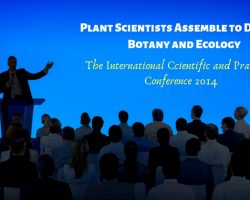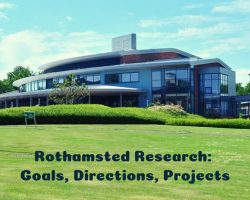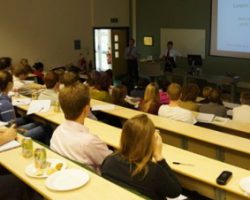Published Articles

Can We Trust Climate Models?
The prediction of climate change associated with human activities is one of the most pressing challenges of science. The modern approach to its solution is based on the use of mathematical models of the climate system, which are currently being intensively developed in many scientific teams of the world.

Plant Scientists Assemble to Discuss Botany and Ecology
On March 20-21, 2014, plant scientists will organize the International scientific and practical conference “Botany and ecology to create a comfortable human environment”, which will be held on March 20-21, 2014 at Park Inn by Radisson Hotel Heathrow, London, U.K.

Rothamsted Research: Goals, Directions, Projects
Rothamsted is the largest research agricultural center in the UK and the oldest agricultural research station in the world. Having a 160-year history, Rothamsted has gained an international reputation as an advanced center for scientific support for sustainable land management and its impact on the environment. Rothamsted conducts a wide range of scientific research in the areas of genetics, biochemistry, cell biology, the study of soil processes at the ecosystem and landscape levels.
Science should not be a niche area for politicians… and vice versa!
by Zoe Self, postdoctoral researcher at the Royal Veterinary College While I was delighted to be invited by the Society for Experimental Biology (SEB) to attend the Society of Biology’s Parliamentary Links Day, I must admit I was a little nervous, not so much for the prestige of the occasion but for my ignorance regarding politics. I tend to pay relatively little attention. I know that I should listen, as the decisions made influence my future career, but until now I’ve allowed politics to be a ‘black box’ that I do not open. I have to say that #LinksDay2015 changed that for me. The morning was opened by Stephen Benn (Society of Biology) and Rt Hon John Bercow MP (Speaker of the House of Commons). We heard from Chi Onwurah MP, who focussed on the ‘culture shock’ of moving from engineering to politics, before being…

What are we pausing?
Michael J Imperiale is professor of microbiology and immunology at the University of Michigan Gain-of-function studies, as the name implies, are experiments in which a new biological behaviour is conferred upon an existing virus e.g. the ability to be transmitted between mammals in the case of the bird flu virus, H5N1. Earlier this month, the United States (US) Government issued a statement indicating that they would implement a pause of new funding for research involving so-called gain-of-function (GOF) experiments. If research into three respiratory viruses, influenza virus, and MERS and SARS coronaviruses, could be “reasonably anticipated” to result in enhanced pathogenicity or increased transmissibility then their funding would be temporarily halted. The US also asked for a voluntary pause of ongoing projects. During the pause, the US is organising discussions aimed at determining the risks and benefits of such research. An important question is do we need…
Science Communication Award 2014 – why apply?
Liz Granger is a previous winner of the Science Communication Award and has just finished a PhD in cell biology. Here she tells us about her experiences after winning the award and why others should apply. During my PhD I got involved with lots of different public engagement projects and school outreach activities. Back in 2012 the awards application process worked slightly differently with a nomination system in place. When a colleague, Davina Whitnall, offered to nominate me I was over the moon. It sounds trite, but I genuinely didn’t expect to win and I was just pleased to be nominated. When I found out I’d won I couldn’t believe it. Doing research was something that I did really enjoy (most of the time) but I realised during my PhD, education and science communication is where my heart lies. I think winning this award has opened a lot…

Experiences from a Life Science Careers Conference
Katie Rule is a second year BSc Human Biology student at the University of South Wales and hopes to go into a career in molecular biology. She tells us about her experience at a Society of Biology Life Sciences Careers Conference on 23rd October 2013. This year my university was lucky enough to hold one of the three annual Life Sciences Careers Conferences and it was brilliant! As a student trying to find which pathway is most suited for you in science, it was amazing to get the opportunity to meet representatives from so many different societies. There were representatives from Society for General Microbiology, Chartered Institute of Ecology and Environmental Management, Biochemical Society, British Pharmacological Society and loads more. Each society brought lots of freebies with them which was great…I am a student after all! The talks provided by people in different scientific careers were extremely informative and gave us all an insight…
Preventing plant disease
Michelle Hulin won the Best Biology Student category of the SET Awards 2013 for her final year project “Preventing Global Disease Spread of a Major Commodity Crop” whilst studying at the University of Bath. Here she blogs about her project and her experience of winning the Award which was judged by the Society of Biology. With the human population predicted to reach 9 billion by 2050, food production must double which will inevitably put our agricultural system under great stress. Plants play an essential role in our day to day lives, providing us food, fibre and other commodities. However, plant pests and pathogens are a major threat to our crops, with fungal pathogens alone causing losses of 10-16% of global food production. Whilst studying Biology (BSc) at the University of Bath, I realised that as the next generation of scientists our research may contribute towards resolving these issues. During my degree I…
“Sorry James, this is not my cup of tea”
Guest post by Dr James Revill, Research Fellow with the Harvard Sussex Program, SPRU, University of Sussex. The issues raised in James’ post will be discussed at our ‘Bioscience to Bioweapons’ Policy Lates event next Thursday, and on Twitter with the hashtag #PolicyLates. The strategic use of disease in warfare has been subject to a long standing and cross-cultural taboo that condemns the hostile exploitation of biology as the act of a pariah. In short, biological weapons are simply not cricket. However, such disapproval is not fixed but context dependent and remains malleable to engineered erosion by governments and other groups . This is a particular concern in light of the twin challenge posed by the changing capacity and geography of bioscience and the evolving perceptions of security, including the perceived rise of terrorism and new wars in the 21st Century, on the other. Such circumstances have been converging to once again…

Podcast: #policylates debates – do we need more scientists in Parliament?
Next Thursday we will be holding the first ever Society of Biology #policylates debate, ‘Do we need more scientists in Parliament?’ If the results from our website poll are anything to go by then the answer would be a resounding yes. To find out if the answer is really this clear cut, Press Officer Rebecca Nesbit investigates in this podcast. She speaks to guests about the advantages and pitfalls of having more scientists in Parliament, science policy and the #policylates debate series. We will be live tweeting as @Society_Biology at the event next Thursday 29th November from 7pm using the hashtag #policylates and will be taking questions to put to the panel. If you have any questions or views to share please comment below or join in the discussions already taking place on the Society of Biology LinkedIn group or our previous blog. Rebecca’s podcast guests were: Harry Dayantis – Imperial Science Communication graduate Dr Jennifer Rohn – Cell biologist, novelist and founder and Chair…
